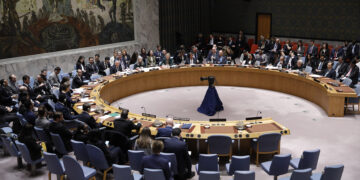Prosecutor Yehia Omar Marwan.
عربي
Prosecutor Yehia Omar Marwan participated in the Egyptian authorities' crushing of independent voices by throwing peaceful activists into extended pretrial detention, as part of a campaign to intimidate them into silence.
Marwan is responsible for the unlawful prosecution of a peaceful social justice and human rights lawyer, punished for opposing restrictions on worker-led trade unions. Marwan charged Haitham Mohamedain, known for calling for "a new life […] where people come before profits," with so-called terrorism and put him in unlawful pretrial detention, where he has remained since May 2019.
"Marwan is a tool in the Egyptian government's suppression of a peaceful and charismatic advocate of worker's rights," said Sarah Leah Whitson, executive director of DAWN. "For the past ten years, prosecutors like Marwan have periodically thrown Haitham Mohamedain in jail on spurious charges, to punish him for organizing workers."
On May 16, 2019, Prosecutor Marwan accused Mohamedain of "intending" to organize a peaceful protest during the Africa Cup of Nations that Egypt was to host the following month. Marwan charged Mohamedain with offenses such as "spreading false news" and "misusing social media platforms."
He then decided to put Mohamedain in pretrial detention for 15 days pending investigation in SSSP Case No. 741/2019 despite the fact that no evidence was presented to back up the charges against him or to indicate that the statutory conditions for pretrial detention, such as dangerousness or risk of flight, were present.
The only witnesses in this case were National Security officers whom Marwan declined to identify to Mohamedain and his lawyer. This decision violated Egyptian law, including Article 134 of the Code of Criminal Procedure, — as well as regional and international legal provisions — which envisaged pretrial detention as an exceptional and limited measure to guarantee the integrity of the preliminary investigation.
Marwan initiated this prosecutorial process despite an obligation, under Articles 61 and 154 of Egypt's Code of Criminal Procedure, to terminate a case if the charges are unfounded, as they are in Mohamedain's case. The lack of evidence and the nature of the charges indicate that Marwan prosecuted Mohamedain merely for his human rights advocacy and for exercising his right to freedom of speech, which are protected by international human rights law.
Although more than two years — the Egyptian statutory limit on pretrial detention – have passed since Marwan put Mohamedain into pretrial detention, Mohamedain remains in jail, due to an abusive process in which Egyptian prosecutors recycle charges against defendants into new cases to reset the clock on pretrial detention.
In 2015, Marwan became the Head of the West Cairo Incident Prosecution. In September 2019, he joined the Supreme State Security Prosecution (SSSP) under Prosecutor General Hamada Elsawy's Decision No. 1692/2019.
On January 13, 2021 , DAWN requested a response from Marwan by writing to the Egyptian government, but no response has been received as of publication.
Tell Marwan to end prosecutorial abuses. Write to him at the Egyptian Public Prosecution's page on Facebook or by email: m.office@ppo.gov.eg, or through the Egyptian Ministry of Justice on Twitter.
About the SSSP
The SSSP is a special agency of the Public Prosecution in Egypt that was established on March 8, 1953 in order to investigate crimes that threaten "state security".
In 1972, the justice minister issued decree No. 1270 which specified the jurisdiction of the SSSP and listed the crimes it can investigate, including crimes related to internal and external security, explosives, assembly, and strikes. SSSP's mandate also includes the crimes reviewed by Emergency State Security Courts, such as terrorism, protesting, and attacks on places of worship.
However, the Egyptian authorities frequently consider peaceful dissent and criticism to be acts of terrorism. For example, the anti-terrorism law criminalizes a wide range of peaceful activities protected by international and even Egyptian human rights protections. The law uses vaguely worded accusations like "spreading false news," "misusing social media", and "joining a terrorist organization" to prosecute activists, human rights defenders, journalists, lawyers, and politicians.
SSSP is composed of public prosecutors who have more power than ordinary public prosecutors, powers that are usually practiced by judges only. SSSP prosecutors can issue binding judicial decisions such as arrest warrants, summons for questioning, and search and asset seizure warrants. They can also order pretrial detention without a judge's decision for initial 15 days (ordinary public prosecutors are allowed to order pretrial detention for up to four days) before referring the defendant to a judge who can renew pretrial detention for up to a total of two years, at the request of the SSSP.
DAWN has, along with other rights groups, documented the role of this agency, headed by Khaled Diaa el-Din, in entrapping those who criticize the regime in seemingly endless pretrial detention, even beyond the two year limit, frequently on baseless charges.
About DAWN's culprit gallery:
Tyrants need enablers who will implement their oppressive practices, even if it means abusing their fellow citizens. These agents often mask their complicity in the guise of professionals exercising their duties in offices, courtrooms, police stations, and interrogation rooms.
DAWN seeks to disclose the identity of the state agents who enable repression and to make them recognizable at home and abroad. These individuals, whom DAWN calls "culprits," bear administrative, civil, moral, legal, and/or political responsibility for human rights and international humanitarian law violations.







































